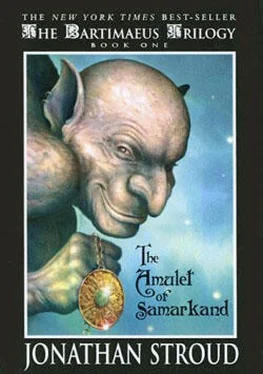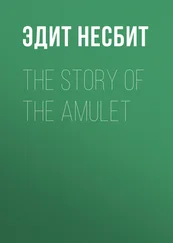Unexpectedly sharp. And cold. No one can say I don't work hard describing things for you.
So right. I've been knocked out at various times by various people in places as far afield as Persepolis, the Kalahari, and Chesapeake Bay.
And I m scrupulously honest, as you know.
Thoughtful persons might at this point object that since Lovelace had stolen the Amulet and was thus working against the Government, it might have been worth a gamble to tell them about his crimes. Perhaps both Nathaniel and I might have then been let off for services rendered. True, but unfortunately there was no knowing who else was involved with Lovelace's plot, and since Sholto Pinn himself had been lunching with Love—lace the previous day, there was certainly no trusting him. All in all, the risks of coming clean far outweighed the possible benefits.
True, as it happens. That would be eight hundred years ago. In those days I was mostly in North America.
Well, this loses something in translation, of course. I shouted it in the language of Old Egypt, which both of them knew and hated. It was a reference to the time when the pharaoh sent his armies deep into the lands of Assyria, causing general mayhem. It is deeply impolite for djinn to bring up between themselves the memories of human wars (in which we are always forced to take sides). Reminding utukku of wars that they lost is both impolite and deeply unwise.
Horla: a powerful subclass of djinni. To a human, horlas appear as shadowy apparitions that cause madness and disease; to other djinn, they radiate a malicious aura that saps our essence.
Almost as much as silver, iron does not do a djinni any good. People have been using it to ward off our influence for millennia; even horseshoes are considered «lucky» because they are made of iron.
The less powerful the being, the quicker and easier it is to summon. Most magical empires employ some magicians specially to rustle up whole cohorts of imps at short notice. Only the greatest empires have the strength in depth to create armies of higher entities. The most formidable such army ever seen was put together by Pharaoh Tuthmosis III in 1478 B.C. It included a legion of afrits and a motley group of higher djinn, of which surely the most notable was… No, modesty prevents my continuing.
Mirror illusion: a particularly cunning and sophisticated spell. It forms false images of a large—scale object—e.g. an army, a mountain, or a castle. They are flat and dissolve away as you pass through them. Mirror illusions can baffle even the cleverest opponent. As demonstrated here.
Many modern products—synthetic plastics, metal alloys, the inner workings of machines—carry so much of the human about them that they afflict our essence if we get too close for too long. It's probably some sort of allergy.
Chance or, as I prefer to think of it, my own quick—wittedness. But it was true that somehow I'd always managed to avoid a full—on fight.
Only without the squeal. Obviously.
At this point someone with excellent hearing might have heard a spurt of webbing being shot furiously into the ceiling in the corner of the room Fortunately, the imp was busy trying to intimidate Underwood by changing its frozen expression very, very slowly. It didn't hear a thing.
I felt a sudden surge of affection for the old fool. Didn't last long. Just thought I'd mention it.
Oops. It looked as if Lovelace had guessed I might escape from Faquarl He must have set spies watching the Tower to trail us once we broke free And I'd led them straight back to the Amulet in double—quick time How embarrassing.
He could have produced the Amulet, agreed to terms, and seen Lovelace head off satisfied into the night. Of course, now that he knew a little of Lovelace's crimes, he would certainly have been bumped off soon afterward, but that breathing space might have given him time to shave his beard, put on a flowery shirt, fly off somewhere hot and sandy and so survive.
How unnecessary. What play—actors these magicians are.
So Faquarl had been right A small army of horlas and utukku had been unable to stop Jabor. This didn't bode too well.
Typical Jabor, this. He's just the sort who'd happily saw off a branch he was sitting on, or paint himself steadily into a corner. If he were given to D.I.Y., that is. Which he isn't.
Don't worry. It was in Old Babylonian. The boy wouldn't have understood the references.
Without much conviction. It seemed a perfectly reasonable desire to me.
Psychology of this sort is not my strong suit. I haven't a clue what motivates most humans and care even less. With magicians it's usually pretty simple: they fall into three distinct types, motivated by ambition, greed, or paranoia. Underwood, for example, now he was the paranoid type, from what I'd seen of him. Lovelace? Easy—ambition leaked from his body like a foul smell. The boy was of the ambitious kind as well, but he was still young, unformed. Hence this sudden ridiculous burst of altruism.
To me. Which is what counts.
One side—benefit of this route was that its difficulties eventually took his mind off the loss of his precious scrying glass. Honestly, the way he went on about it, you'd think that imp was his blood brother, rather than a vulgar baby impersonator trapped against its will. He did seem to have taken his misfortune personally. But after the loss of his beloved Mrs. Underwood, I suppose the disc was his only friend in the world, poor thing.
A "good master" is a contradiction in terms, of course. Even Solomon would have been insufferable, he was so prissy in his early years, but fortunately he could command 20,000 spirits with one twist of his magic ring, so with him I got plenty of days off.
Obviously not classical history. This ignorance would have upset Faquarl, as it happens, who often boasted how he'd given Odysseus the idea for the wooden horse in the first place. I'm sure he was lying, but I can't prove it because I wasn't at Troy: I was in Egypt at the time.
They've got the worst taste in the world, magicians. Always have done. Oh, they keep themselves all suave and sober in public, but give them a chance to relax and do they listen to chamber orchestras? No. They'd rather have a dwarf on stilts or a belly—dancing bearded lady any day. A little—known fact about Solomon the Wise: he was entertained between judgements by an enthusiastic troupe of Lebanese clowns.
Even though they have been scraped and shaped by human will, fields do not have magicians' stench about them. Throughout history, magicians have been resolutely urban creatures: they flourish in cities, multiplying like plague rats, running along thickly spun threads of gossip and intrigue like fat—bellied spiders. The nearest that nonurban societies get to magicians are the shamans of North America and the Asian steppe But they operate so differently that they almost deserve not to be called magicians at all. But their time is past.
Читать дальше









